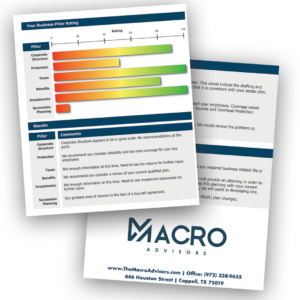- 972-338-9655
- [email protected]
- 446 Houston Street, Suite 200 | Coppell,TX 75019
A life insurance policy is a contract with an insurance company. By agreeing to pay routine premiums for the policy, the insurer provides a sum of money, otherwise known as the death benefit to beneficiaries upon the insured’s death. The main purpose of a life insurance policy is to provide financial protection to those dependent on the deceased. It is the only way to guarantee the exact amount of money needed (the death benefit), exactly when you need it (at death).
 A premium refers to the amount of money paid to a life insurance company in exchange for coverage. For many policies, premiums can be paid monthly, quarterly or annually. If you are not able to pay your premium, you will be at risk of losing your life insurance protection. That’s why it’s essential that you work with your clients to choose a policy that best fits their current situation.
A premium refers to the amount of money paid to a life insurance company in exchange for coverage. For many policies, premiums can be paid monthly, quarterly or annually. If you are not able to pay your premium, you will be at risk of losing your life insurance protection. That’s why it’s essential that you work with your clients to choose a policy that best fits their current situation.
When working with clients to determine the best policy for their situation, there are a variety of things to consider:
Many times the budget will dictate which solution is appropriate. Once you establish a budget, the premium payments will become a habit, just like other insurance purchases.
There are more than five million small businesses in the United States; yet only 47% of those businesses have any form of business life insurance (U.S. Small Business Administration, 2006). Without proper protection, adversities like the loss of a key employee (death or competitor), a lawsuit, or a natural disaster could be devastating to the business and the owner.
A deferred compensation plan is when an employer allocates a portion of an employee’s compensation and sets it aside to be paid to the employee at a later date, most commonly at retirement. Employees can defer tax liability until the payout is received and earn interest on the portion of income that is deferred. These types of plans are typically used to incentivise an employee to stay at the company and reward them for staying.
The Leveraged Deferred Compensation Strategy (LDCS) utilizes an Indexed Universal Life (IUL) contract offered by a top-tier insurance company. In addition to a permanent death benefit, this strategy leverages loans into the policy’s to provide tax-free income in retirement. The LDCS is designed to enhance a traditional deferred compensation plan through leverage. This leverage is provided by utilizing premium finance.
If you are a business owner looking for ways to reward yourself or key employees with a tax-advantaged retirement program, Business Owner Succession Strategy or B.O.S.S is a program worth considering. It is a non-qualified benefit plan for business owners and key employees.
Benefit plans are often the leveraging tool that makes the difference and puts you ahead of the competition. As you consider the many options available, expand your thinking to be certain you are also rewarding yourself in the process, consider the executive bonus.
Split Dollar life insurance allows businesses to take advantage of differing tax rates and is a strategic way to retain key employees. When properly set up, Split Dollar is a tax beneficial arrangement in which a company and a person split and share a life insurance contract.
Buy/Sell Agreements funding by life insurance give business owners the reassurance their business and family will be taken care of in their absence. This funding creates rules for what will happen when a business owner needs to transfer his or her interest in the company or when a business owner ceases to be an owner of the business for any reason. If more than one person owns a business, those partners should have a buy-sell agreement in place.

Ready For Your Snapshot?
Uncover the financial blindspots in your business with a complimentary Snapshot Report.
Sign Up for Weekly Tax-Strategy Updates